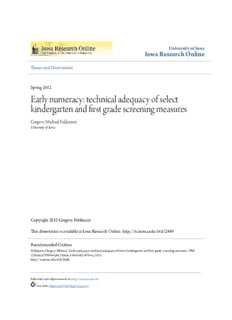
Early numeracy: technical adequacy of select kindergarten and first grade screening measures PDF
Preview Early numeracy: technical adequacy of select kindergarten and first grade screening measures
University of Iowa Iowa Research Online Theses and Dissertations Spring 2012 Early numeracy: technical adequacy of select kindergarten and first grade screening measures Gregory Michael Feldmann University of Iowa Copyright 2012 Gregory Feldmann This dissertation is available at Iowa Research Online: https://ir.uiowa.edu/etd/2869 Recommended Citation Feldmann, Gregory Michael. "Early numeracy: technical adequacy of select kindergarten and first grade screening measures." PhD (Doctor of Philosophy) thesis, University of Iowa, 2012. https://doi.org/10.17077/etd.msauhm34 Follow this and additional works at:https://ir.uiowa.edu/etd Part of theEducational Psychology Commons EARLY NUMERACY: TECHNICAL ADEQUACY OF SELECT KINDERGARTEN AND FIRST GRADE SCREENING MEASURES by Gregory Michael Feldmann An Abstract Of a thesis submitted in partial fulfillment of the requirements for the Doctor of Philosophy degree in Psychological and Quantitative Foundations in the Graduate College of The University of Iowa May 2012 Thesis Supervisors: Associate Professor Kristen Missall Professor Stewart Ehly 1 ABSTRACT Because of a greater need to focus on early achievement in mathematics and increased global competition in this area, emphasis is increasingly being placed upon screening and monitoring of math development in early elementary to ensure progress for all students. Although protocols for early literacy assessment exist, research of psychometrically sound and instructionally useful early numeracy assessment methods is still developing. Thus, the current study was undertaken to further develop and examine early numeracy measures. In a two-year investigation, 72 kindergarten and 57 first-grade students completed a set of existing and newly developed early numeracy curriculum- based measurement (EN-CBM) tools. Reliability and validity of these measures were examined both within and across years. The nature of score change across the academic year was also analyzed. Findings were generally similar to those published in previous EN-CBM research. Alternate-form reliability estimates were largely adequate for screening purposes. Although concurrent and predictive validity estimates varied as a function of screening period and the outcome criterion, these estimates were generally moderate to strong. EN- CBM discriminant validity evidence was mixed for the kindergarten measures but more evident for first-grade tools. All measures demonstrated score change that was statistically significant over time with at least moderate to large effect sizes for most measures. Implications for EN-CBM use as screening tools are discussed. Study limitations are presented as are suggestions for future EN-CBM research. 2 Abstract Approved: __________________________________________________ Thesis Supervisor __________________________________________________ Title and Department __________________________________________________ Date __________________________________________________ Thesis Supervisor __________________________________________________ Title and Department __________________________________________________ Date EARLY NUMERACY: TECHNICAL ADEQUACY OF SELECT KINDERGARTEN AND FIRST GRADE SCREENING MEASURES by Gregory Michael Feldmann A thesis submitted in partial fulfillment of the requirements for the Doctor of Philosophy degree in Psychological and Quantitative Foundations in the Graduate College of The University of Iowa May 2012 Thesis Supervisors: Associate Professor Kristen Missall Professor Stewart Ehly Copyright by GREGORY MICHAEL FELDMANN 2012 All Rights Reserved Graduate College The University of Iowa Iowa City, Iowa CERTIFICATE OF APPROVAL ___________________________ PH.D. THESIS ____________ This is to certify that the Ph.D. thesis of Gregory Michael Feldmann has been approved by the Examining Committee for the thesis requirement for the Doctor of Philosophy degree in Psychological and Quantitative Foundations at the May 2012 graduation. Thesis Committee: __________________________________________________ Kristen Missall, Thesis Supervisor __________________________________________________ Stewart Ehly, Thesis Supervisor __________________________________________________ Robert D. Ankemann __________________________________________________ John L. Hosp __________________________________________________ Susan Assouline ACKNOWLEDGMENTS I want to thank Sam J. Bowek whose support was invaluable and work with students is admirable. I am appreciative of the interest, patience, and support of my immediate and extended family; I am fortunate to be your son, brother, and in-law. Jacob, Nathan, and Lauren have made being a parent a never ending adventure. You each bring joy to my world and to that of those around you. Most notable and worthy of recognition is Erin. She not only allowed, but encouraged and supported the harebrained idea of her then father-of-one husband to return to graduate school. She had more patience and understanding than her ever grateful, now a father-of-three, husband could have wanted. ii TABLE OF CONTENTS LIST OF TABLES ...............................................................................................................v LIST OF FIGURES ........................................................................................................... vi CHAPTER 1 INTRODUCTION ...........................................................................1 Value of Mathematical Knowledge .............................................................1 International and National Analysis.............................................................2 Introduction to the Problem .........................................................................5 Curriculum-Based Measurement .................................................................6 Research Purpose .........................................................................................7 CHAPTER 2 LITERATURE REVIEW ..............................................................10 Importance of Early Mathematics Development .......................................10 Number Sense ............................................................................................12 Early Elementary Math ..............................................................................13 Content and Process Domains: Number and Operations ...............14 Essential Core Skills: Empirical Support .......................................15 Measurement of Early Academic Skills ....................................................18 Value of Early Screening ...............................................................18 Curriculum-Based Measurement: A Description ...........................20 Curriculum-Based Measurement: Early Numeracy ...................................27 Oral Counting.................................................................................31 Number Identification ....................................................................32 Quantity Discrimination.................................................................34 Missing Number.............................................................................36 Computation ...................................................................................38 Early Numeracy-CBM: Cautions and Future Directions ...........................39 Cautions .........................................................................................39 Rationale for Current Study and Future Directions .......................42 New EN-CBM Tools .....................................................................46 Research Questions ....................................................................................48 CHAPTER 3 METHODS ....................................................................................49 Participants .................................................................................................49 Instruments .................................................................................................49 Early Numeracy – Curriculum-Based Measurement .....................49 Number Identification ........................................................49 Quantity Discrimination.....................................................50 Math Computation .............................................................52 Closer Number ...................................................................53 Verbal Math .......................................................................54 iii Criterion Measures .........................................................................56 Teacher Rating ...................................................................56 WIAT-2 Math Reasoning ..................................................57 Report Card ........................................................................58 Iowa Tests of Basic Skills ..................................................58 Procedures ..................................................................................................59 Data Analysis .............................................................................................61 CHAPTER 4 RESULTS ......................................................................................64 Introduction ................................................................................................64 Descriptive Statistics ..................................................................................64 Reliability ...................................................................................................65 Validity ......................................................................................................67 Relationships Among Variables ....................................................67 Concurrent Convergence ...............................................................68 Discriminant ...................................................................................70 Predictive .......................................................................................71 Developmental Sensitivity .........................................................................74 CHAPTER 5 DISCUSSION ................................................................................77 Summary and Interpretation of the Findings .............................................78 Reliability Evidence .......................................................................78 Validity Evidence...........................................................................80 Sensitivity ......................................................................................85 Implications for Practice ............................................................................87 Limitations and Considerations .................................................................89 Future Research .........................................................................................92 Summary ....................................................................................................95 APPENDIX A TABLES...............................................................................................96 APPENDIX B SAMPLE KINDERGARTEN PROBES ............................................115 APPENDIX C SAMPLE FIRST-GRADE PROBES .................................................120 APPENDIX D FIGURES ...........................................................................................126 BIBLIOGRAPHY ............................................................................................................136 iv
Description: